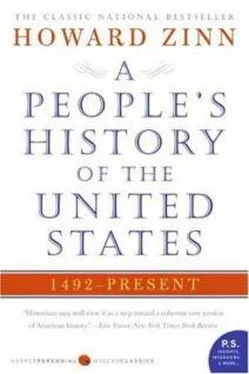Howard Zinn - A People
Здесь есть возможность читать онлайн «Howard Zinn - A People» весь текст электронной книги совершенно бесплатно (целиком полную версию без сокращений). В некоторых случаях можно слушать аудио, скачать через торрент в формате fb2 и присутствует краткое содержание. Издательство: Harper-Collins, Жанр: Фэнтези, на английском языке. Описание произведения, (предисловие) а так же отзывы посетителей доступны на портале библиотеки ЛибКат.
- Название:A People
- Автор:
- Издательство:Harper-Collins
- Жанр:
- Год:неизвестен
- ISBN:нет данных
- Рейтинг книги:4 / 5. Голосов: 1
-
Избранное:Добавить в избранное
- Отзывы:
-
Ваша оценка:
- 80
- 1
- 2
- 3
- 4
- 5
A People: краткое содержание, описание и аннотация
Предлагаем к чтению аннотацию, описание, краткое содержание или предисловие (зависит от того, что написал сам автор книги «A People»). Если вы не нашли необходимую информацию о книге — напишите в комментариях, мы постараемся отыскать её.
A People — читать онлайн бесплатно полную книгу (весь текст) целиком
Ниже представлен текст книги, разбитый по страницам. Система сохранения места последней прочитанной страницы, позволяет с удобством читать онлайн бесплатно книгу «A People», без необходимости каждый раз заново искать на чём Вы остановились. Поставьте закладку, и сможете в любой момент перейти на страницу, на которой закончили чтение.
Интервал:
Закладка:
A Reuters dispatch from Iraq described the destruction of a seventy-three-room hotel in a town south of Baghdad, and quoted an Egyptian witness: "They hit the hotel, full of families, and then they came back to hit it again." Reuters reported that the air raids on Iraq first used laser-guided bombs, but within a few weeks turned to B-52s, which carried conventional bombs, meaning more indiscriminate bombing.
American reporters were kept from seeing the war close-up, and their dispatches were subject to censorship. Apparently recalling how press reports of civilian casualties had affected public opinion during the Vietnam war, the U.S. government was taking no chances this time.
A Washington Post reporter complained about the control of information, writing (January 22, 1991):
The bombing has involved… dozens of high-flying B-52 bombers equipped with huge, unguided munitions. But the Pentagon has not allowed interviews with B-52 pilots, shown videotapes of their actions or answered any questions about the operations of an aircraft that is the most deadly and least accurate in the armada of more than 2000 U.S. and allied planes in the Persian Gulf region…
In mid-February, U.S. planes dropped bombs on an air raid shelter in Baghdad at four in the morning, killing 400 to 500 people. An Associated Press reporter who was one of few allowed to go to the site said: "Most of the recovered bodies were charred and mutilated beyond recognition. Some clearly were children." The Pentagon claimed it was a military target, but the AP reporter on the scene said: "No evidence of any military presence could be seen inside the wreckage." Other reporters who inspected the site agreed.
After the war, fifteen Washington news bureau chiefs complained in a joint statement that the Pentagon exercised "virtual total control… over the American press" during the Gulf War.
But while it was happening, leading television news commentators behaved as if they were working for the United States government. For instance, CBS correspondent Dan Rather, perhaps the most widely seen of the TV newsmen, reported from Saudi Arabia on a film showing a laser bomb (this one dropped by British aircraft in support of the American war) hitting a marketplace and killing civilians. Rather's only comment was: "We can be sure that Saddam Hussein will make propaganda of these casualties."
When the Soviet government tried to negotiate an end to the war, bringing Iraq out of Kuwait before the ground war could get under way, top CBS correspondent Lesley Stahl asked another reporter: "Isn't this the nightmare scenario? Aren't the Soviets trying to stop us?" (Ed Siegel, TV reporter for the Boston Globe , February 23, 1991).
The final stage of the war, barely six weeks after it had begun, was a ground assault which, like the air war, encountered virtually no resistance. With victory certain and the Iraqi army in full flight, U.S. planes kept bombing the retreating soldiers who clogged the highway out of Kuwait City. A reporter called the scene "a blazing hell… a gruesome testament… To the east and west across the sand lay the bodies of those fleeing."
A Yale professor of military history, Michael Howard, writing in the New York Times (January 28, 1991), quoted the military strategist Clausewitz approvingly: "The fact that a bloody slaughter is a horrifying act must make us take war more seriously, but not provide an excuse for gradually blunting our swords in the name of humanity." Howard went on to say: "In this conflict of wills, the bottom line remains a readiness to kill and be killed…"
The human consequences of the war became shockingly clear after its end, when it was revealed that the bombings of Iraq had caused starvation, disease, and the deaths of tens of thousands of children. A U.N. team visiting Iraq immediately after the war reported that "the recent conflict has wrought near-apocalyptic results upon the infrastructure… Most means of modern life support have been destroyed or rendered tenuous…"
A Harvard medical team reporting in May said that child mortality had risen steeply, and that 55,000 more children died in the first four months of the year (the war lasted from January 15 to February 28) than in a comparable period the year before.
The director of a pediatric hospital in Baghdad told a New York Times reporter that on the first night of the bombing campaign the electricity was knocked out: "Mothers grabbed their children out of incubators, took intravenous tubes out of their arms. Others were removed from oxygen tents and they ran to the basement, where there was no heat. I lost more than 40 prematures in the first 12 hours of the bombing."
Although in the course of the war Saddam Hussein had been depicted by U.S. officials and the press as another Hitler, the war ended short of a march into Baghdad, leaving Hussein in power. It seemed that the United States had wanted to weaken him, but not to eliminate him, in order to keep him as a balance against Iran. In the years before the Gulf War, the United States had sold arms to both Iran and Iraq, at different times favoring one or the other as part of the traditional "balance of power" strategy.
Therefore, as the war ended, the United States did not support Iraqi dissidents who wanted to overthrow the regime of Saddam Hussein. A New York Times dispatch from Washington, datelined March 26, 1991, reported: "President Bush has decided to let President Saddam Hussein put down rebellions in his country without American intervention rather than risk the splintering of Iraq, according to official statements and private briefings today."
This left the Kurdish minority, which was rebelling against Saddam Hussein, helpless. And anti- Hussein elements among the Iraqi majority were also left hanging. The Washington Post reported (May 3, 1991): "Major defections from the Iraqi military were in the offing in March at the height of the Kurdish rebellion, but never materialized because the officers concluded the U.S. would not back the uprising…"
The man who had been Jimmy Carter's National Security Adviser, Zbigniew Brzezinski, a month after the end of the Gulf War, gave a cold assessment of the pluses and minuses of the event. "The benefits are undeniably impressive. First, a blatant act of aggression was rebuffed and punished… Second, U.S military power is henceforth likely to be taken more seriously… Third, the Middle East and Persian Gulf region is now clearly an American sphere of preponderance."
Brzezinski, however, was concerned about "some negative consequences." One of them was that "the very intensity of the air assault on Iraq gives rise to concern that the conduct of the war may come to be seen as evidence that Americans view Arab lives as worthless…And that raises the moral question of the proportionality of response."
His point about Arab lives being seen as «worthless» was underlined by the feet that the war provoked an ugly wave of anti-Arab racism in the United States, with Arab-Americans insulted or beaten or threatened with death. There were bumper stickers that said "I don't brake for Iraqis." An Arab-American businessman was beaten in Toledo, Ohio.
Brzezinski's measured assessment of the Gulf War could be taken as close to representing the view of the Democratic Party. It went along with the Bush administration. It was pleased with the results. It had some misgivings about civilian casualties. But it did not constitute an opposition.
President George Bush was satisfied. As the war ended, he declared on a radio broadcast: "The specter of Vietnam has been buried forever in the desert sands of the Arabian peninsula."
The Establishment press very much agreed. The two leading news magazines, Time and Newsweek , had special editions hailing the victory in the war, noting there had been only a few hundred American casualties, without any mention of Iraqi casualties. A New York Times editorial (March 30, 1991) said: " America 's victory in the Persian Gulf war… provided special vindication for the U.S. Army, which brilliantly exploited its firepower and mobility and in the process erased memories of its grievous difficulties in Vietnam."
Читать дальшеИнтервал:
Закладка:
Похожие книги на «A People»
Представляем Вашему вниманию похожие книги на «A People» списком для выбора. Мы отобрали схожую по названию и смыслу литературу в надежде предоставить читателям больше вариантов отыскать новые, интересные, ещё непрочитанные произведения.
Обсуждение, отзывы о книге «A People» и просто собственные мнения читателей. Оставьте ваши комментарии, напишите, что Вы думаете о произведении, его смысле или главных героях. Укажите что конкретно понравилось, а что нет, и почему Вы так считаете.












